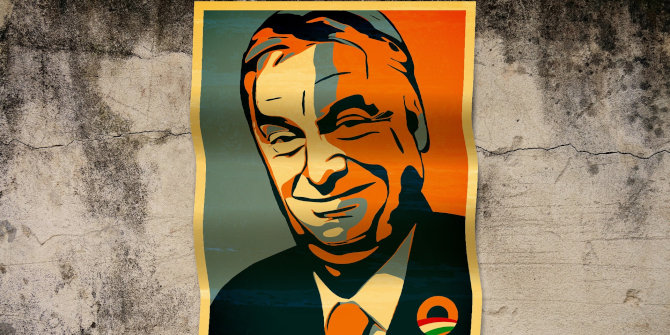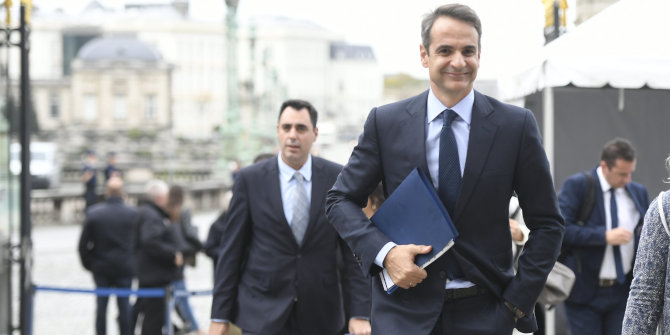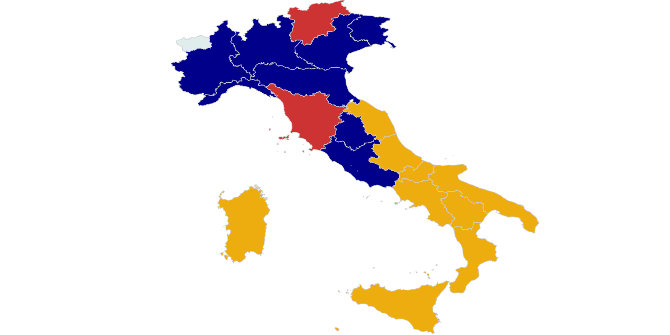The Czech Republic will hold a parliamentary election on 8 and 9 October. Ahead of the election, Monika Brusenbauch Meislová and Petr Suchý assess what the vote might mean for the country’s foreign policy.
The Czech Republic heads to the polls for a parliamentary election on 8 and 9 October. This will be the country’s tenth democratic election for the Chamber of Deputies (the lower chamber of parliament) since 1989 and the eighth since becoming an independent state after the dissolution of Czechoslovakia in 1993.
Much is at stake in this election, including the future direction that Czech foreign policy might take. To assess how the election might affect foreign policy, we have examined the 2021 election manifestos for each of the political parties currently represented in the Chamber of Deputies, especially in relation to EU policy, NATO membership, and relations with Russia and China.
Election manifestos traditionally constitute a prominent source of data for the study of party politics in the Czech Republic and there is evidence that Czech voters base their voting decisions primarily on what is written in them. This said, there are some obvious limitations to relying solely on election manifestos and we therefore also consider how parties actually put their foreign policy positions into practice.
ANO 2011
The Czech Republic is currently governed by a coalition between ANO 2011, led by the current Prime Minister and billionaire media tycoon Andrej Babiš, and the left-wing Czech Social Democratic Party (ČSSD). ANO 2011 is a populist party which used to present itself as centre-right. It has now ended up as a leftist movement that draws its support from voters of traditional leftist parties.
ANO’s EU policy uses robust nationalistic rhetoric, explicitly putting the interests of the nation state first. The party’s manifesto makes heavy use of the ‘othering’ approach, constructing a clear dichotomy between ‘us’ and ‘them’ where its foreign policy positions are framed as a direct contradiction to those of the opposition parties. A clear example of this approach comes at the very beginning of the manifesto:
“In the EU, we will maintain our veto and we will not support the possibility of a majority voting on major issues of finance, taxation, the welfare system or foreign and security policy and migration, as the Pirate Party is planning to do. We will not hand over the sovereignty of the Czech Republic to the European Parliament or the European Commission. We will not exchange the Czech crown for the euro, as TOP 09 and the Pirate Party want to do.”
The manifesto is declaratorily pro-European in the sense that it accentuates the importance of the EU and considers EU membership to be a key pillar of the country’s foreign policy. But while the manifesto is strong on rhetoric, this orientation is heavily compromised by the way in which Babiš has previously sought to implement his EU policy, which has traditionally been highly reactive and transactional.
In April this year, an investigation by the European Commission concluded that Babiš had breached conflict of interest rules in relation to his Agrofert conglomerate. In response, Babiš has repeatedly mocked the EU’s institutions and framed the investigation as an attack on the Czech Republic. His record of fierce opposition to the development of a common migration policy and his frequent cooperation with Hungary’s Viktor Orbán do not sit particularly well with the manifesto’s proclamations either.
Moreover, the manifesto is couched in vague generalisations and includes a series of puzzling and contradictory statements. For instance, it pledges that the EU “should, once again, begin to pursue an active foreign policy”, whilst arguing that it should not “deal with new agendas and acquire more powers”. Elsewhere, it vows to “prepare well for the second Czech presidency”, despite Babiš having once described the presidency as just “blathering with sandwiches”. All of this serves to confirm that ANO’s foreign policy priorities remain heavily dependent on the whims of its leader, who strategically adapts the party’s stances to meet his own needs.
Czech Social Democratic Party
The Czech Social Democratic Party – the oldest political party in the country – is currently doing badly in the polls and is on the verge of losing its representation in parliament. Somewhat surprisingly, the party’s manifesto contains no explicit reflection on EU policy, with the ČSSD’s campaign marked by a focus on domestic issues. Elsewhere, the party claims to be pursuing a pro-EU policy and promoting cooperation with the EU, but its approach to the EU has been highly ambivalent in practice.
In April this year, liberal and pro-EU forces within the party lost a key leadership race against the conservative wing. The result of this contest ensured the ČSSD would continue to be headed by Jan Hamáček, a loyal ally of the Czech President, Miloš Zeman. The latter has long been known for his pro-Kremlin and pro-China views and is considered by some to be “the most influential Kremlin ally in Central Europe”. Hamáček will be counting on the President’s support in the upcoming elections.
Pirates and Mayors
Pirates and Mayors (Piráti a STAN) are one of the main opposition electoral coalitions. This pro-European electoral coalition consists of the liberal centre-left Pirate Party (Piráti) and the centrist Mayors and Independents (STAN). The foreign policy approach outlined in the coalition’s manifesto is the most elaborate of all those considered here.
Decidedly pro-integrationist, it places the Czech Republic firmly as a member of the EU’s core, envisioning it as a country that “participates in solving common challenges, defends a strong functioning Europe, is able to promote its legitimate interests, actively comments on EU legislation… speaks substantively on European issues [and] initiates joint action in the interests of the citizens of the Czech Republic and other member states.”
Its ambitious EU agenda puts emphasis on the expertise of the Czech representatives in the EU, with a section of the manifesto specifically dedicated to the upcoming 2022 Czech EU presidency. Generally strong on specific proposals, the manifesto – in contrast to the other main party manifestos – outlines concrete steps for the adoption of the euro, namely applying for participation in the European Exchange Rate Mechanism II. Interestingly enough, unlike some of the other main parties and alliances, the coalition abstains from stressing cooperation within the Visegrád Group.
Together
The joint ballot of Together (SPOLU) is the other main opposition electoral alliance. This includes the centre-right Civic Democratic Party (ODS), the liberal pro-European TOP 09, and the conservative centrist Christian Democratic Union – Czechoslovak People’s Party (KUD-ČSL). Offering the prospect of an “unequivocal orientation towards the West”, the manifesto claims that “the future of the Czech Republic is in the EU and NATO”.
According to the manifesto, there will be moves to return to the traditions of former President Václav Havel when it comes to foreign policy, with the defence of human rights featuring prominently in the party’s agenda. The manifesto states that the alliance is “proud of Czech knowhow in promoting human rights and the development of civil society”. Havel’s focus on human rights has traditionally been endorsed by TOP 09. The manifesto also emphasises a ‘NATO first’ policy in relation to defence, indicating that “we believe in Atlantic cooperation” and that “a European army would be a dead end”.
Importantly, as is often the case with electoral coalitions, many important topics have been sidelined in the manifesto, including the country’s relationship with the EU. Indeed, the three parties differ markedly in their EU policies. The manifesto thus does not refer to the adoption of the euro at all. The reason being that while TOP 09 advocates joining the euro as soon as possible (as it expects this will improve the country’s position in the international community) and the KDU-ČSL has expressed lukewarm support towards the common currency, the ODS is sceptical when it comes to deepening European integration and rejects adoption of the euro altogether. There is also no common ground in the parties’ views towards Poland or sanctions against Viktor Orbán either.
Freedom and Direct Democracy
Another major opposition party is the far-right, anti-migration and unequivocally anti-EU Freedom and Direct Democracy (SPD). The party, led by a Japan-born Czech nationalist, Tomio Okamura, is currently the most Eurosceptic in the parliament. Ahead of the 2021 elections, the foreign policy section of the party manifesto calls for a ‘Czexit’, advocating withdrawal from the EU and describing the SPD as “the only parliamentary party that advocates the restoration of the sovereignty of our Republic”.
The SPD proposes that in/out referendums should be held on the country’s membership of the EU and NATO, while the manifesto foreshadows a favourable attitude towards cooperation with Russia and China. The manifesto also uses strong nationalist rhetoric with isolationist elements, outlining expansive promises to put the interests of the nation state first. Yet, it explains neither what these national interests entail nor how exactly the party would secure them.
Communist Party of Bohemia and Moravia
In a similar vein, the manifesto of the Communist Party of Bohemia and Moravia (KSČM), which faces the possibility of failing to gain any seats in the Chamber of Deputies, also presents a clear alternative foreign policy vision, as it advances a referendum on EU membership. Generally light on detail, it is committed to leaving what it calls the “NATO pact” as well as to withdrawing the Czech army from all military missions. This is coupled with calls for the restoration of comprehensive relations with Russia and China.
Future prospects
Foreign policy issues have so far lacked prominence in the election campaign and they have been far from central in the pre-election debates. However, they remain important for the country’s future and the main party manifestos devote sections to these issues, albeit with varying levels of detail.
Both of the two main opposition coalitions – ‘Pirates and Mayors’ and ‘Together’ – have presented manifestos which are far more pro-Western, pro-EU and pro-NATO than those of the other parties. They are also substantially more critical of Russia and China. At the same time, however, even though the parties within these coalitions have managed to put their policy differences aside, at least for the moment, one should bear in mind that they nevertheless diverge in a number of foreign policy areas, both in policy terms and in style.
This is nicely illustrated by their membership of different groups in the European Parliament. Whereas the KDU-ČSL, TOP 09 and STAN sit with the European People’s Party, the ODS is a member of the European Conservatives and Reformists Group and the Pirate Party is a member of the Group of the Greens/European Free Alliance. These differing perspectives may potentially lead to post-election tensions when trying to form a government.
But let us not get ahead of ourselves. The pre-election polls currently place ANO in first place. President Zeman has, moreover, announced that he intends to invite the leader of the most successful party, and not the leader of one of the electoral coalitions (as he consider electoral coalitions to be a ‘scam’), to form the new government. And while doubts and uncertainties surrounding the election result are in abundance, one thing looks rather certain: turbulent days lie ahead in the heart of Europe.
Note: This article gives the views of the authors, not the position of EUROPP – European Politics and Policy or the London School of Economics. Featured image credit: European Council





